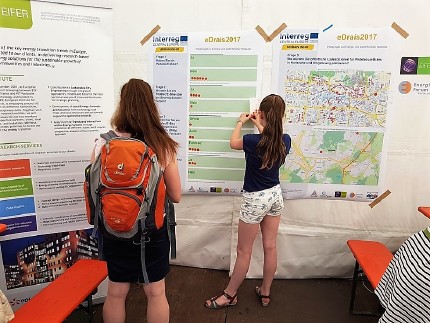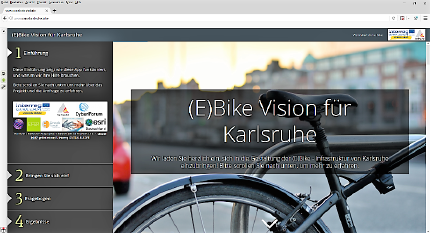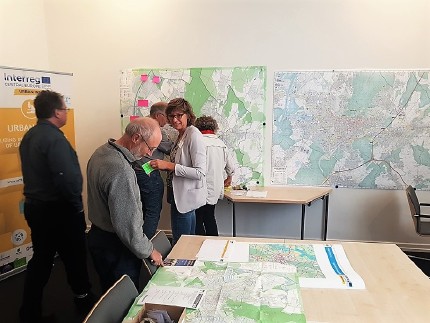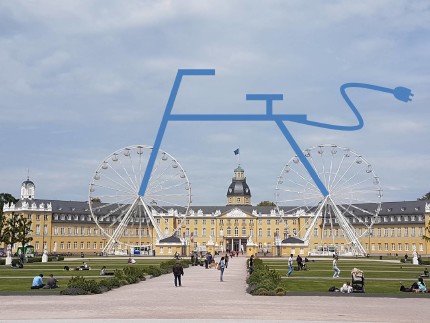KARLSRUHE PILOT: eDrais2017
Participative methods for eBike infrastructure building in the Karlsruhe region with focus on energy issues
Thematic field: ENER - Energy
PILOT DESCRIPTION
The Karlsruhe pilot is embedded in the context of the German energy transition with special focus on the use of distributed renewable energy sources and on the concept of ‘prosumer’ (merging of the roles producer and consumer in the energy system), focusing the increase of citizens’ participation in local infrastructure building and energy awareness. Thereby, the role of citizens empowerment in the decision making process towards renewable energy development, rational energy production, use and storage was at the core of the pilot. This covers e.g. the combination of the design of a specific charging infrastructure with the use of renewable generated electricity for eBikes in the urban area. Pursuing the pilot’s goal of implementing and evaluating participatory methods in urban innovation processes, two different participatory methods were used in order to actively involve citizens in the discussion process: Public Participation Geo Information System (PPGIS) and Future Workshop.
THE ROLE OF END-USERS IN PILOT DEVELOPMENT
The Karlsruhe pilot has been embedded in the celebrations for the 200th birthday of the bicycle invention (Carl Drais invented the bicycle in Karlsruhe in 1817). At the event ‘FahrradFestival’ at the end of May 2017, the pilot team did contact citizens for participating in a first testing phase of the participative method ‘PPGIS’ (Public Participation-Geo Information System) and for recruiting participants for the second participative method “Future Workshop” in September 2017. Afterwards, citizens had the possibility to further test the PPGIS online in June and July 2017 and contributed to the further development of this method. By participating in the Future Workshop in September, citizens were invited to discuss the situation of eBike usage in Karlsruhe, especially regarding energy-related issues, with representatives from the municipality and relevant local economy. Both the possibility for test usage of the PPGIS and the invitation to the Future Workshop were announced primarily by the communication channels of the pilot team partners (websites, newsletters) as well as by the municipality (website, newsletter, PR).
MAIN STAKEHOLDERS INVOLVED
Key stakeholder in the pilot was the Municipality of Karlsruhe, since the offices of the city are responsible and authorized for e.g. the planning of bicycle tracks or the charging stations infrastructure. Furthermore, the municipality has been the main interface for the pilot project team regarding the contact to the citizenry.
PERSPECTIVES
The pilot addressed infrastructure and energy efficiency issues that are also a thematic focus of the initiative “Fahrradstadt 2025+” (bicycle city 2025+). Therefore, the results from the two participatory methods have an impact on the long-term development of the city of Karlsruhe. Apart from that, the pilot has raised awareness about the benefits of involving citizens in the policy-making process, as well as increases the overall transparency and acceptance for policy decisions.

FahrradFestival Participants

Crowdsourcing method PPGIS

Future Workshop
MORE ON KARLSRUHE PILOT:
Karlsruhe PILOT: Start of Testing Participatory Methods at FahrradFestival
Karlsruhe PILOT: Future workshop for future mobility
Karlsruhe PILOT: Energy4u - Connect Ideas2Business
KARLSRUHE PILOT: eDrais2017 – final evaluation of citizen participation
Karlsruhe PILOT: Workshop ‘Karlsruhe – unterwegs in Richtung Zukunft‘

Karlsruhe: 200th birthday of the bicycle invention
